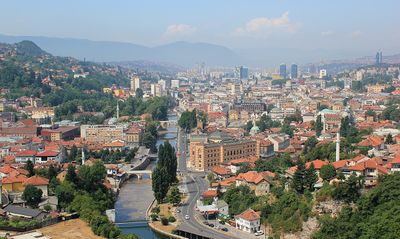Gynopedia needs your support! Please consider contributing content, translating a page, or making a donation today. With your support, we can sustain and expand the website. Gynopedia has no corporate sponsors or advertisers. Your support is crucial and deeply appreciated.
Sarajevo
OVERVIEW
Contraception (Birth Control)
General Note: There are many types of contraceptives, also known as "birth control," including IUDs, oral contraceptives, patches, shots, and condoms, etc. If you would like to view a full list, click here.
Laws & Social Stigmas
In Bosnia and Herzegovina, you can purchase condoms and birth control pills at pharmacies without a prescription.<[1] [2] However, for other forms of birth control, such as implants, injectables, and IUDs, you may need to directly visit a hospital or clinic to obtain them.
What to Get & Where to Get It
Costs
Emergency Contraception (Morning After Pill)
Important Notes: Emergency contraception may prevent pregnancy for three days (72 hours) and sometimes five days (120 hours) after unprotected sex. Take EC as soon as possible after unprotected sex to prevent pregnancy. If you don't have access to dedicated EC, oral contraceptives can be used as replacement EC, but remember the following: 1) Only some contraceptives work as EC 2) Different contraceptives require different dosages and time schedules to work as EC 3) You must only use the first 21 pills in 28-day packs and 4) They may be less effective than dedicated EC. For general information on emergency contraceptives, click here and here.
Laws & Social Stigmas
In Bosnia and Herzegovina, emergency contraceptive pills (morning after pills) are available in pharmacies.[3] While a prescription is technically required by law, we have found anecdotal evidence that suggests that pharmacists often sell ECPs without requiring a prescription.[4] However, we still need to confirm whether these laws are commonly followed by some pharmacists (if you know, update this page).[5]
The lowest cadre of health workers that are allowed to dispense emergency contraceptive pills (morning after pills) are gynecologists.[6]
It is estimated that about 62% of women (ages 15-49) in the country have knowledge of emergency contraceptive pills, as of 2011-2012.[7]
What to Get & Where to Get It
- Emergency contraceptive pills are available. While a prescription is technically required, you may be able to purchase them over-the-counter at some pharmacies (since not all pharmacists seem to observe the law[8] ... but we're still researching this topic). You can find emergency contraceptive pills at pharmacies, clinics, or programs affiliated with the International Planned Parenthood Foundation. Some brands you may find are NorLevo 1.5mg, Vikela, and ellaOne.[9]
Costs
- The cost of emergency contraceptive pills in Bosnia and Herzegovina may depend on which entity of the country you're in. For example, in you're in the republic of Srpska, emergency contraceptive pills may be fully reimbursed by social security (if you have social security coverage). However, in the Federation of Bosnia and Herzegovina, you'll probably need to pay the full price out of pocket, since the pills are not covered by social security.ref>ECEC - Bosnia and Herzegovina</ref>
- For LNG type of pills (such as Vikela), you can expect to pay around € 15 to € 23, as of 2015. For UPA pills (such as ellaOne), you can expect to pay around € 20 to € 30, as of 2015.[10] ref>ECEC - Bosnia and Herzegovina</ref>
Sexually Transmitted Infections (STIs/STDs)
Important Notes - Learn about PEP and PrEP: If you think that you've been recently exposed to HIV (i.e. within 72 hours), seek out PEP (Post-Exposure Prophylaxis). It's a month-long treatment to prevent HIV infection after exposure, and it may be available in your city. Take PEP as soon as possible. For more information, click here. If you are at risk of HIV exposure, seek out PrEP (Pre-Exposure Prophylaxis). It's a daily oral pill that can prevent HIV infection before exposure. To learn more about PrEP, click here.
Laws & Social Stigmas
What to Get & Where to Get It
Testing Facilities
Support
Costs
Medications & Vaccines
Laws & Social Stigmas
What to Get & Where to Get It
Costs
Menstruation
Note: In addition to pads and tampons, you can also use menstrual cups and menstrual underwear for your period. To learn more about menstrual cups, click here. To learn more about menstrual underwear, click here.
Laws & Social Stigmas
What to Get & Where to Get It
Costs
Gynecological Exams
Laws & Social Stigmas
What to Get & Where to Get It
Costs
Pregnancy
Laws & Social Stigmas
What to Get & Where to Get It
Costs
Abortion
Important Note: There are two main types of abortions: medical (also known as the "abortion pill") and surgical (also known as "in-clinic"). For medical abortions, you take a pill to induce abortion. For surgical abortions, a procedure is performed to induce abortion. For general information about medical and surgical abortions, click here.
Laws & Social Stigmas
What to Get & Where to Get It
Costs
Advocacy & Counseling
Laws & Social Stigmas
What to Get & Where to Get It
Costs
List of Additional Resources
- Federal Ministry of Health
- UNFPA - Bosnia and Herzegovina
- Association XY: "Association XY is a non-governmental, non-political, non-profitable organization which works to improve sexual and reproductive health (SRH) in Bosnia and Herzegovina."
- Equaldex - Bosnia and Herzegovina: Click here to learn about LGBTQ rights and laws in Bosnia and Herzegovina.
References
- ↑ Global Oral Contraception Availability
- ↑ Free the Pill: Where on Earth?
- ↑ EC Status and Availability - Bosnia and Herzegovina
- ↑ ECEC - Bosnia and Herzegovina
- ↑ EC Status and Availability - Bosnia and Herzegovina
- ↑ ECEC - Bosnia and Herzegovina
- ↑ ECEC - Bosnia and Herzegovina
- ↑ ECEC - Bosnia and Herzegovina
- ↑ EC Status and Availability - Bosnia and Herzegovina
- ↑ EC Status and Availability - Bosnia and Herzegovina
